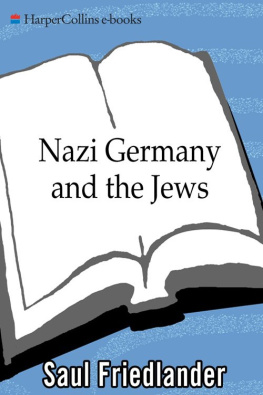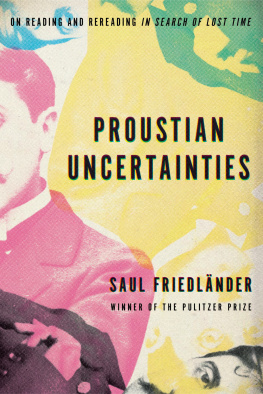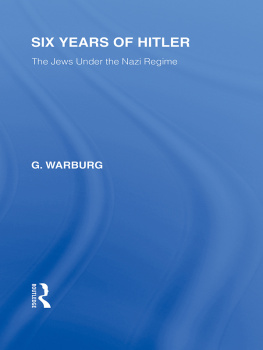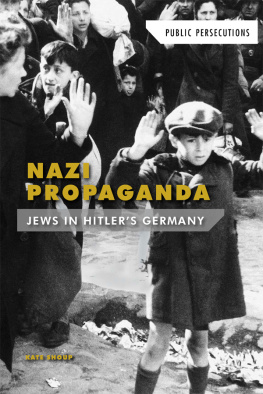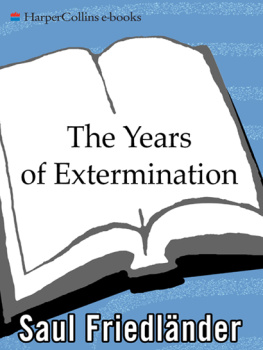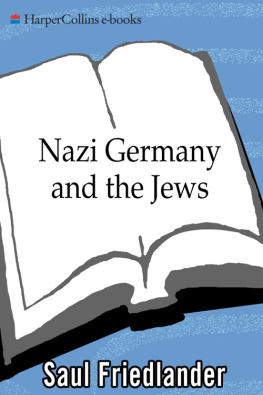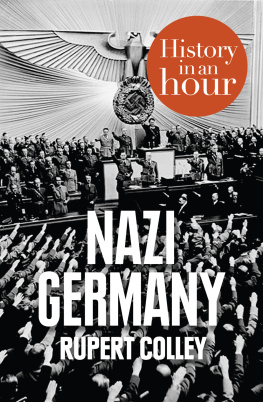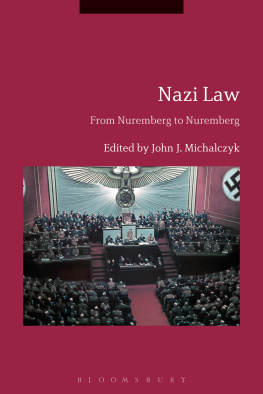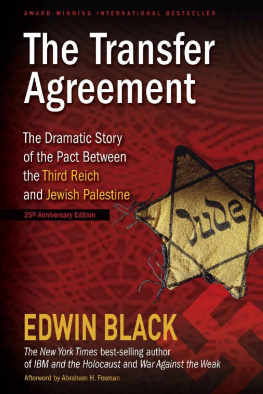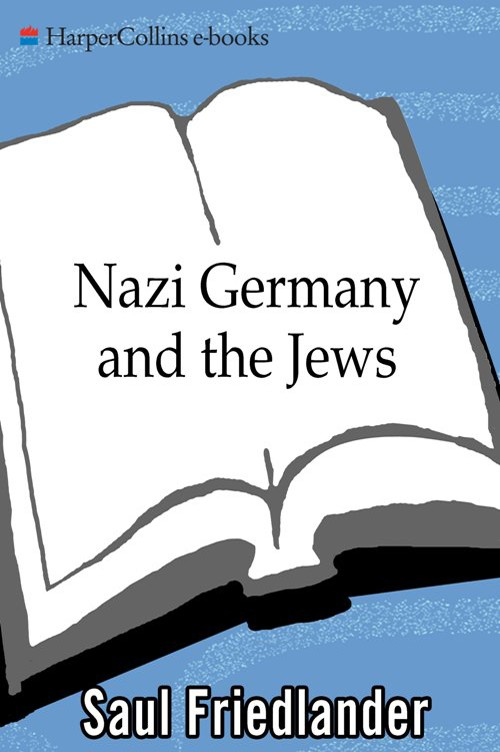Most historians of my generation, born on the eve of the Nazi era, recognize either explicitly or implicitly that plowing through the events of those years entails not only excavating and interpreting a collective past like any other, but also recovering and confronting decisive elements of our own lives. This recognition does not generate any agreement among us about how to define the Nazi regime, how to interpret its internal dynamics, how to render adequately both its utter criminality and its utter ordinariness, or, for that matter, where and how to place it within a wider historical context. Yet, despite our controversies, many of us share, I think, a sense of personal involvement in the depiction of this past, which gives a particular urgency to our inquiries.
For the next generation of historiansand by now also for the one after thatas for most of humanity, Hitlers Reich, World War II, and the fate of the Jews of Europe do not represent any shared memory. And yet, paradoxically, the centrality of these events in present-day historical consciousness seems much greater than it was some decades ago. The ongoing debates tend to unfold with unremitting bitterness as facts are questioned and evidence denied, as interpretations and commemorative endeavors confront one another, and as statements about historical responsibility periodically come to the fore in the public arena. It could be that in our century of genocide and mass criminality, apart from its specific historical context, the extermination of the Jews of Europe is perceived by many as the ultimate standard of evil, against which all degrees of evil may be measured. In these debates, the historians role is central. For my generation, to partake at one and the same time in the memory and the present perceptions of this past may create an unsettling dissonance; it may, however, also nurture insights that would otherwise be inaccessible.
Establishing a historical acccount of the Holocaust in which the policies of the perpetrators, the attitudes of surrounding society, and the world of the victims could be addressed within an integrated framework remains a major challenge. Some of the best-known historical renditions of these events have focused mainly on the Nazi machinery of persecution and death, paying but scant attention to the wider society, to the wider European and world scene or to the changing fate of the victims them The present study will attempt to convey an account in which Nazi policies are indeed the central element, but in which the surrounding world and the victims attitudes, reactions, and fate are no less an integral part of this unfolding history.
In many works the implicit assumptions regarding the victims generalized helplessness and passivity, or their inability to change the course of events leading to their extermination, have turned them into a static and abstract element of the historical background. It is too often forgotten that Nazi attitudes and policies cannot be fully assessed without knowledge of the lives and indeed of the feelings of the Jewish men, women, and children themselves. Here, therefore, at each stage in the description of the evolving Nazi policies and the attitudes of German and European societies as they impinge on the evolution of those policies, the fate, the attitudes, and sometimes the initiatives of the victims are given major importance. Indeed, their voices are essential if we are to attain an understanding of this past. For it is their voices that reveal what was known and what could be known; theirs were the only voices that conveyed both the clarity of insight and the total blindness of human beings confronted with an entirely new and utterly horrifying reality. The constant presence of the victims in this book, while historically essential in itself, is also meant to put the Nazis actions into full perspective.
It is easy enough to recognize the factors that shaped the overall historical context in which the Nazi mass murder took place. They determined the methods and scope of the Final Solution; they also contributed to the general climate of the times, which facilitated the way to the exterminations. Suffice it here to mention the ideological radicalizationwith fervent nationalism and rabid anti-Marxism (later anti-Bolshevism) as its main propelling drivesthat surfaced during the last decades of the nineteenth century and reached its climax after World War I (and the Russian Revolution); the new dimension of massive industrial killing introduced by that war; the growing technological and bureaucratic control exerted by modern societies; and the other major features of modernity itself, which were a dominant aspect of Nazism.necessary cluster of elements that shaped the course of events leading from persecution to extermination.
With regard to that process, I have emphasized Hitlers personal role and the function of his ideology in the genesis and implementation of the Nazi regimes anti-Jewish measures. In no way, however, should this be seen as a return to earlier reductive interpretations, with their sole emphasis on the role (and responsibility) of the supreme leader. But, over time, the contrary interpretations have, it seems to me, gone too far. Nazism was not essentially driven by the chaotic clash of competing bureaucratic and party fiefdoms, nor was the planning of its anti-Jewish policies mainly left to the cost-benefit calculations of technocrats.
But Hitlers policies were not shaped by ideology alone, and the interpretation presented here traces the interaction between the Fhrer and the system within which he acted. The Nazi leader did not take his decisions independently of the party and state organizations. His initiatives, mainly during the early phase of the regime, were molded not only by his worldview but also by the impact of internal pressures, the weight of bureaucratic constraints, at times the influence of German opinion at large and even the reactions of foreign governments and foreign opinion.
To what extent did the party and the populace partake in Hitlers ideological obsession? Redemptive anti-Semitism was common fare among the party elite. Recent studies have also shown that such extreme anti-Semitism was not unusual in the agencies that were to become central to the implementation of the anti-Jewish policies, such as Reinhard Heydrichs Security Service of the SS (Sicherheitsdienst, or SD).and economic resentment that found its expression in extreme anti-Jewish initiatives. In other words, within the party and, as we shall see, sometimes outside it, there were centers of uncompromising anti-Semitism powerful enough to transmit and propagate the impact of Hitlers own drive. Yet, among the traditional elites and within the wider reaches of the population, anti-Jewish attitudes were more in the realm of tacit acquiescence or varying degrees of compliance.
Despite most of the German populations full awareness, well before the war, of the increasingly harsh measures being taken against the Jews, there were but minor areas of dissent (and these were almost entirely for economic and specifically religious-ideological reasons). It seems, however, that the majority of Germans, although undoubtedly influenced by various forms of traditional anti-Semitism and easily accepting the segregation of the Jews, shied away from widespread violence against them, urging neither their expulsion from the Reich nor their physical annihilation. After the attack on the Soviet Union, when total extermination had been decided upon, the hundreds of thousands of ordinary Germans (as distinct from the highly motivated SS units, among others) who actively participated in the killings acted no differently from the equally numerous and ordinary Austrians, Rumanians, Ukrainians, Baits, and other Europeans who became the most willing operatives of the murder machinery functioning in their midst. Nonetheless, whether they were conscious of it or not, the German and Austrian killers had been indoctrinated by the regimes relentless anti-Jewish propaganda, which penetrated every crevice of society and whose slogans they at least partially internalized, mainly in the context of the war in the East.

